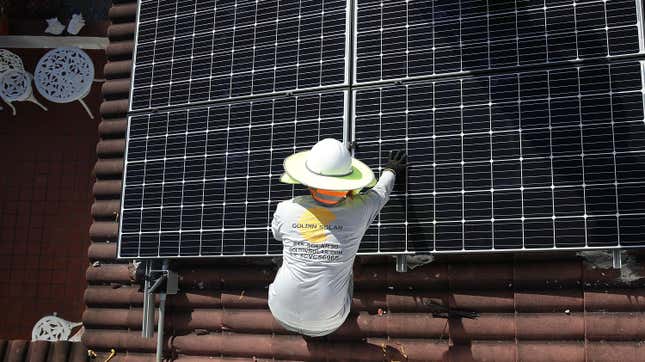
Utilities in Florida, it seems, have been extra busy this year writing laws that advance their interests and slow climate action. According to emails obtained by the Miami Herald and Floodlight, the state’s biggest utility, Florida Power and Light, directly drafted a bill that would restrict rights for rooftop solar owners, and seems to have paid off politicians to make sure it was introduced.
Reading through the emails is a pretty infuriating exercise in seeing a clear path of how money influences politics. Jennifer Bradley, a first-term senator, had a meeting this fall with utility industry representatives, including those from FPL.
On October 8, a member of Bradley’s staff emailed FPL’s lobbyist asking for “follow up information or language in regards to the net metering bill you discussed with Senator Bradley.” The lobbyist arranged to “drop [text] off” with Bradley in person at the statehouse the following week. On October 18, the staff member emailed the lobbyist again asking for “an electronic copy of the net metering bill so I can put it into drafting.” Records show that NextEra Energy, FPL’s parent company and the largest utility in the country, gave $10,000 to Bradley’s political committee on October 20, two days after that email; Bradley filed the bill in November. (NextEra told the Herald that the money was given without “an expectation of favor.” Okay, sure.)
FPL is a familiar name to solar advocates, and this isn’t the first time they’ve tried to kneecap rooftop solar. The concept that FPL wanted to hamstring in this piece of legislation is what’s known as “net metering,” a practice that allows rooftop solar owners to sell excess energy they generate with their equipment back onto the grid. In recent years, many utilities around the country have been fighting against state net metering regulations, trying to drive down prices they pay for customer-generated solar or attempting to eliminate the practice altogether in the interest of maintaining control of energy generation. While only about 1% of the state’s solar customers actually engage in net metering, FPL claims that the practice—which encourages people to actually install rooftop solar—could cost Florida utilities up to $700 million by 2025.
“This is a tired tactic that utilities have used to maintain their monopoly grip on electricity markets,” Will Giese, southeast regional director for the Solar Energy Industries Association, told the Miami Herald. “Net metering is a popular program that gives people the right to choose the energy that works for them, provides benefits to all ratepayers and creates thousands of energy jobs across Florida.”
FPL is also no stranger to using money to try and sway politicians on this and other issues. An investigation published earlier this month by the Orlando Sentinel shows that FPL donated $3 million to and coordinated closely with a dark money effort to spoil certain state elections last year by backing what were known as “ghost candidates,” or candidates entered into races to split the Democratic vote and push a favored Republican up; that same investigation found that FPL has donated $10 million to dark money groups in this same web. Representative Lawrence McClure (who introduced a matching anti-net-metering bill in the House a week after Bradley’s legislation was introduced in the Senate) has long and deep ties to the utility industry and has taken money from various groups and sources connected to NextEra and FPL. McClure didn’t get any cash directly from either entity this time, he did get a hefty $10,000 check on November 4, days after filing his version of the bill, from a group in the dark-money web that FPL has contributed to.
Utilities often are able to fly under the radar as political forces, but there is no overstating the power and influence that many utilities have on energy policy—and the ways in which they’ll exert that influence to get what they want. People in Florida, watch out—your utilities are writing their own rules.